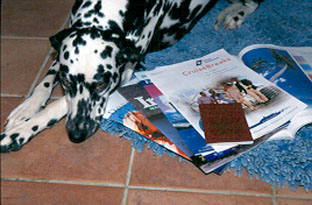- Home
- FAQs
- Customer Video Gallery
- Customer Photo Gallery
- Bird Facts
- Bird Food Blog
- Bird Information
- Feeding Advice
- Small Animal Information
- A to Z of Guinea Pigs
- A to Z of Hamsters
- A to Z of Rabbits
- Basic Care for Guinea Pigs
- Basic Care for Hamsters
- Basic Care for Rabbits
- Basic care for Chinchillas
- Basic care for Ferrets
- Basic care for Gerbils
- Basic care for Mice
- Basic care for Rats
- Buying a Healthy Small Animal
- Does your Reptile need a Licence
- Equipment for Ferrets
- Equipment for Hamsters
- Equipment for Mice
- Equipment for your Chinchilla
- Equipment for your Gerbil
- Equipment for your Guinea Pig
- Equipment for your Rabbit
- Keeping a House Rabbit
- Dog Information
- Cat Information
- Customer Information
- Fat Balls
- Suet Pellets
- Straights
- Seed Mixes
- Suet Treats
- Mealworms
- Bird Feeders
- My Account
Dog Passports
An English dog abroad
If you are thinking of travelling overseas with your dog, follow our up-to-date advice to avoid falling foul of border controls!
Conflicting reports and opinions may have made the Pet Passport scheme seem hopelessly complicated and fraught with problems. While there are still kinks to iron out, the pilot scheme is most definitely on track and it’s really your preparation that will ensure your dog has as good a holiday as you do. The important thing to remember is that you need separate documentation to go out of Great Britain and to come back in again – i.e. an export document and a re-entry certificate.
Forward Planning:
The importance of planning early cannot be stressed enough. Before leaving Great Britain, your dog must do the equivalent of six months of ‘quarantine’ at home with you. Don’t worry, this doesn’t mean he has to stay indoors – it just means that the time he would have spent in kennels after a trip waiting for rabies symptoms to possibly show up, is done before travelling, after his rabies vaccination. Unfortunately this means there’s no chance of you and Rover whizzing off on a last-minute deal unless you've made preparations for this beforehand.
Acquiring a re-entry certificate:
Right from the start you need to find a vet who is a Local Veterinary Inspector (LVI) – ie approved to certify dogs for the scheme - and, fortunately, many vets hold this status. The next step is to have your dog microchipped and given a rabies vaccine. If your dog is already chipped it’s a good idea to have him scanned just to make sure the chip is reading properly and can be found easily. One early traveler on the scheme had to have her dog’s chip read over a dozen times with two scanners before it could be found – it was only because she had her own mini-scanner and had checked her dog herself that morning that she was adamant border staff kept searching!
Thirty days after your dog’s rabies vaccination, a blood test needs to be taken to ensure the vaccine has worked. If it has, your dog will have qualified for the certificate of re-entry (the pet passport) and you can now wait out the rest of the six months before travelling. If the blood test has failed, your dog will need subsequent rabies vaccinations until a successful test is shown.
Prices for microchipping, the rabies vaccine and blood tests vary. From a random selection of vets across the UK, Wetnose was quoted between £125 and £175 for microchipping, vaccinating against rabies and blood-testing.
One big mistake people make is in assuming the pet passport is the same as a human one and can be used on both legs of a journey. Its correct name, the certificate of re-entry, is exactly that – a document that can only get you back into Britain.
Taking your dog out of Great Britain:
You also need to have the correct export paperwork in order to enter the country you are planning to visit. This is available from your nearest animal health office (for details see the Ministry of Agriculture, Farms and Fisheries (MAFF) website link in our Net Links box, above right).
The export paperwork varies from country to country – which is why a touring holiday around Europe is hugely over-complicated to arrange. You would need to contact the animal health office in each country before you get there to arrange what is needed – and do you really want to be doing that when you should be relaxing?
Tip: If you are only planning to go to France, your LVI will be able to supply an alternative to the animal export certificate (providing your dog has his pet passport) in the form of a PETS5 certificate.
Other essentials:
So assuming you are planning a straightforward trip to France, the rest of the paperwork you will need in addition to your certificate of re-entry and your PETS5 certificate is:
A MAFF form to give to your carrier (eg Eurotunnel) stating your dog hasn’t been outside of the EU. You can contact MAFF on 0870 241 1710.
Your dog’s vaccination card showing his microchip number, rabies inoculation and all his other vaccinations.
Other vaccinations and treatments:
It is not compulsory to have your dog vaccinated against the usual British ailments (eg parvovirus), although it is recommended. Neither is having your dog treated for fleas and ticks before you travel, but it would be extremely wise to make sure your dog is dosed before you go. Keep checking your dog for ticks while you are away, as our dogs have no natural immunity against foreign invaders!
Heartworm and leishmaniasis are continental killers: if your dog contracts either ailment his prospects are not good. Heartworm is easily preventable – obtain Stronghold from your vet and treat your dog with it before you leave. Leishmaniasis is carried by sandflies and occurs mainly around the Mediterranean, although it has started to spread further north. If you are visiting this area find a vet as soon as you arrive and ask him about preventative measures. No treatments can be given before you leave the UK and there is no cure – so prevention is essential.
Getting there:
Your method of travel is probably the most important factor as far as your dog is concerned. You can travel by ferry, but your dog will have to remain in the car and you can’t stay with him. Obviously the length of the trip, how rough the crossing is and how distressed and hot your dog becomes while he’s cooped up in the car will be determining factors here. The last thing you want is a dog so ill or shell-shocked from traveling neither he or you can enjoy yourselves. Hoverspeed is quicker, but again you can’t stay with your pet.
The best option by far is to travel by Eurotunnel: the journey time is shorter and you are with your dog in the car. Of course you could always fly overseas, risking all the potential problems of putting your dog in the luggage-hold, but there are only a few flights bringing pet passport dogs back to the UK (for a full list of carriers see end of article).
Coming home:
After your lovely relaxing holiday, enjoying the sunshine and good food (European restaurants are much more dog-friendly than those here in the UK), the return journey is when you need your wits about you most. You must have your dog treated for fleas and ticks between 24 and 48 hours before you come home. Because of this, a good option is to spend the last day or two of your holiday in the town you are traveling from so that you can find a vet who is authorised under the scheme and has the correct paperwork. A few early travelers were caught out because although they had their dog correctly treated by a French vet, he didn’t have the appropriate form. Bureaucracy, unfortunately, rules the day!
If you’re worried about asking a vet abroad for the correct treatment, help is at hand. A free information card carrying all the necessary phrases in French, German, Spanish, Portuguese, Italian and English has been produced by animal health company Merial. The cards are available from your own vet, so don’t forget to ask for one before you go on holiday.
Before you get on the ferry or train, border guards will check your dog and his paperwork and ask you to sign a Declaration of Residence. This states that your dog hasn’t been to any countries other than those in the scheme during your holiday or within the previous six months.
Keeping Britain free of rabies and other unpleasant ailments (canine and human!) is of paramount importance, so although all the necessary forms and papers may seem like overkill, the more double-checks done on each dog the better.
Insurance cover:
Another vitally important factor to consider before taking your dog abroad is pet insurance. Many canine insurance companies now offer travel insurance as an extension of your dog’s existing cover, or a one-off policy covering the duration of your trip. Prices and quality of cover vary enormously, so shop around.
Pet carriers:
At the moment these are the only carriers who can bring your dog back to the UK under the pilot Pet Passport scheme:
By sea:
By rail:
By air:
Under the current pilot scheme only the following countries are included:
If you are thinking of travelling overseas with your dog, follow our up-to-date advice to avoid falling foul of border controls!

Conflicting reports and opinions may have made the Pet Passport scheme seem hopelessly complicated and fraught with problems. While there are still kinks to iron out, the pilot scheme is most definitely on track and it’s really your preparation that will ensure your dog has as good a holiday as you do. The important thing to remember is that you need separate documentation to go out of Great Britain and to come back in again – i.e. an export document and a re-entry certificate.
Forward Planning:
The importance of planning early cannot be stressed enough. Before leaving Great Britain, your dog must do the equivalent of six months of ‘quarantine’ at home with you. Don’t worry, this doesn’t mean he has to stay indoors – it just means that the time he would have spent in kennels after a trip waiting for rabies symptoms to possibly show up, is done before travelling, after his rabies vaccination. Unfortunately this means there’s no chance of you and Rover whizzing off on a last-minute deal unless you've made preparations for this beforehand.
Acquiring a re-entry certificate:
Right from the start you need to find a vet who is a Local Veterinary Inspector (LVI) – ie approved to certify dogs for the scheme - and, fortunately, many vets hold this status. The next step is to have your dog microchipped and given a rabies vaccine. If your dog is already chipped it’s a good idea to have him scanned just to make sure the chip is reading properly and can be found easily. One early traveler on the scheme had to have her dog’s chip read over a dozen times with two scanners before it could be found – it was only because she had her own mini-scanner and had checked her dog herself that morning that she was adamant border staff kept searching!
Thirty days after your dog’s rabies vaccination, a blood test needs to be taken to ensure the vaccine has worked. If it has, your dog will have qualified for the certificate of re-entry (the pet passport) and you can now wait out the rest of the six months before travelling. If the blood test has failed, your dog will need subsequent rabies vaccinations until a successful test is shown.
Prices for microchipping, the rabies vaccine and blood tests vary. From a random selection of vets across the UK, Wetnose was quoted between £125 and £175 for microchipping, vaccinating against rabies and blood-testing.
One big mistake people make is in assuming the pet passport is the same as a human one and can be used on both legs of a journey. Its correct name, the certificate of re-entry, is exactly that – a document that can only get you back into Britain.
Taking your dog out of Great Britain:
You also need to have the correct export paperwork in order to enter the country you are planning to visit. This is available from your nearest animal health office (for details see the Ministry of Agriculture, Farms and Fisheries (MAFF) website link in our Net Links box, above right).
The export paperwork varies from country to country – which is why a touring holiday around Europe is hugely over-complicated to arrange. You would need to contact the animal health office in each country before you get there to arrange what is needed – and do you really want to be doing that when you should be relaxing?
Tip: If you are only planning to go to France, your LVI will be able to supply an alternative to the animal export certificate (providing your dog has his pet passport) in the form of a PETS5 certificate.
Other essentials:
So assuming you are planning a straightforward trip to France, the rest of the paperwork you will need in addition to your certificate of re-entry and your PETS5 certificate is:
A MAFF form to give to your carrier (eg Eurotunnel) stating your dog hasn’t been outside of the EU. You can contact MAFF on 0870 241 1710.
Your dog’s vaccination card showing his microchip number, rabies inoculation and all his other vaccinations.
Other vaccinations and treatments:
It is not compulsory to have your dog vaccinated against the usual British ailments (eg parvovirus), although it is recommended. Neither is having your dog treated for fleas and ticks before you travel, but it would be extremely wise to make sure your dog is dosed before you go. Keep checking your dog for ticks while you are away, as our dogs have no natural immunity against foreign invaders!
Heartworm and leishmaniasis are continental killers: if your dog contracts either ailment his prospects are not good. Heartworm is easily preventable – obtain Stronghold from your vet and treat your dog with it before you leave. Leishmaniasis is carried by sandflies and occurs mainly around the Mediterranean, although it has started to spread further north. If you are visiting this area find a vet as soon as you arrive and ask him about preventative measures. No treatments can be given before you leave the UK and there is no cure – so prevention is essential.
Getting there:
Your method of travel is probably the most important factor as far as your dog is concerned. You can travel by ferry, but your dog will have to remain in the car and you can’t stay with him. Obviously the length of the trip, how rough the crossing is and how distressed and hot your dog becomes while he’s cooped up in the car will be determining factors here. The last thing you want is a dog so ill or shell-shocked from traveling neither he or you can enjoy yourselves. Hoverspeed is quicker, but again you can’t stay with your pet.
The best option by far is to travel by Eurotunnel: the journey time is shorter and you are with your dog in the car. Of course you could always fly overseas, risking all the potential problems of putting your dog in the luggage-hold, but there are only a few flights bringing pet passport dogs back to the UK (for a full list of carriers see end of article).
Coming home:
After your lovely relaxing holiday, enjoying the sunshine and good food (European restaurants are much more dog-friendly than those here in the UK), the return journey is when you need your wits about you most. You must have your dog treated for fleas and ticks between 24 and 48 hours before you come home. Because of this, a good option is to spend the last day or two of your holiday in the town you are traveling from so that you can find a vet who is authorised under the scheme and has the correct paperwork. A few early travelers were caught out because although they had their dog correctly treated by a French vet, he didn’t have the appropriate form. Bureaucracy, unfortunately, rules the day!
If you’re worried about asking a vet abroad for the correct treatment, help is at hand. A free information card carrying all the necessary phrases in French, German, Spanish, Portuguese, Italian and English has been produced by animal health company Merial. The cards are available from your own vet, so don’t forget to ask for one before you go on holiday.
Before you get on the ferry or train, border guards will check your dog and his paperwork and ask you to sign a Declaration of Residence. This states that your dog hasn’t been to any countries other than those in the scheme during your holiday or within the previous six months.
Keeping Britain free of rabies and other unpleasant ailments (canine and human!) is of paramount importance, so although all the necessary forms and papers may seem like overkill, the more double-checks done on each dog the better.
Insurance cover:
Another vitally important factor to consider before taking your dog abroad is pet insurance. Many canine insurance companies now offer travel insurance as an extension of your dog’s existing cover, or a one-off policy covering the duration of your trip. Prices and quality of cover vary enormously, so shop around.
Pet carriers:
At the moment these are the only carriers who can bring your dog back to the UK under the pilot Pet Passport scheme:
By sea:
- Caen to Portsmouth -
Brittany Ferries - St Malo to Portsmouth -
Britanny Ferries - Calais to Dover -
Hoverspeed, P&O Stena, SeaFrance - Cherbourg to Portsmouth -
P&O Portsmouth - Le Havre to Portsmouth -
P&O Portsmouth
By rail:
- Calais (Coquelles) to Folkestone (Cheriton) -
Eurotunnel (not the Eurostar)
By air:
- Amsterdam (Schipol) -
British Midland - Frankfurt -
Lufthansa - Helsinki -
Finnair - Palma (Majorca) -
British Midland - Paris -
British Midland (guide dogs only)
Under the current pilot scheme only the following countries are included:
- Andorra
- Austria
- Belgium
- Denmark
- Finland
- France
- Germany
- Gibraltar
- Greece
- Iceland
- Italy
- Liechtenstein
- Luxembourg
- Monaco
- Netherlands
- Norway
- Portugal (including the Azores and Madeira)
- San Marino
- Spain (including the Canary Islands)
- Sweden
- Switzerland
- Vatican City










